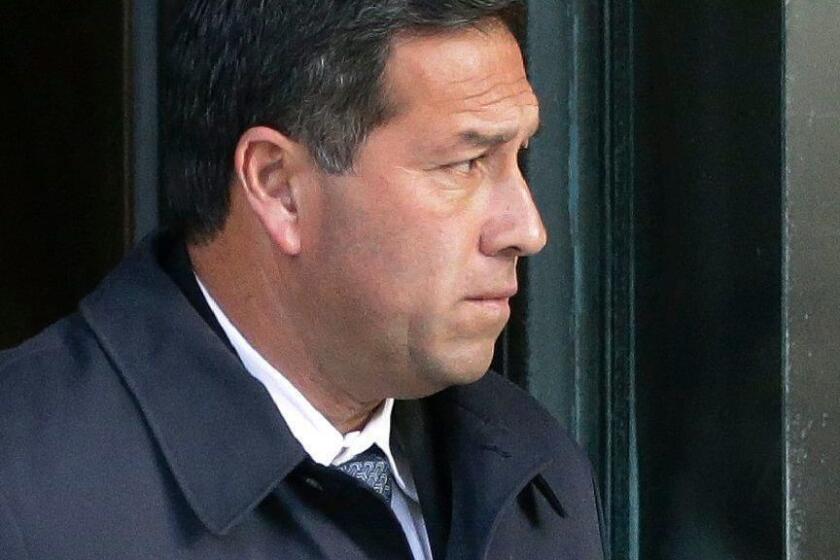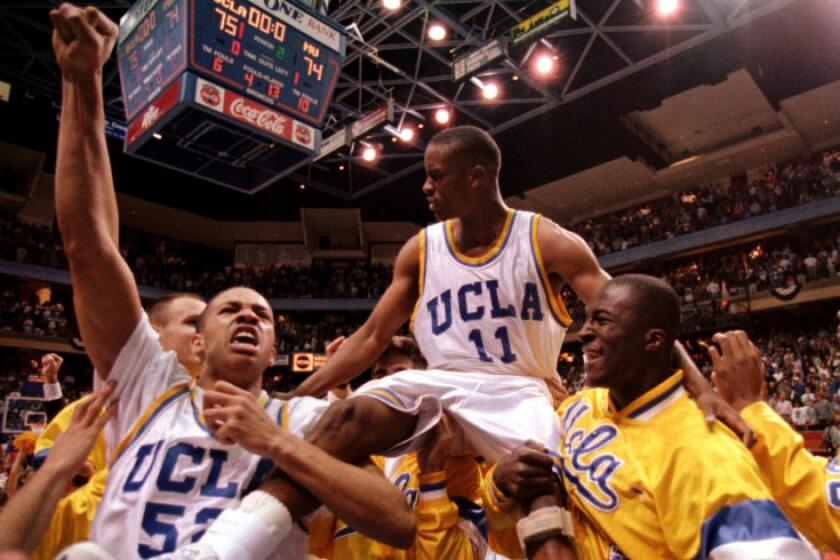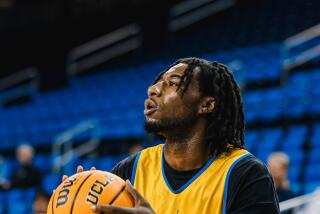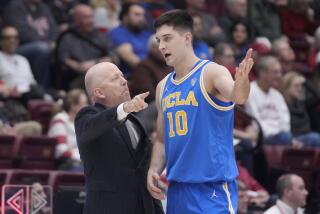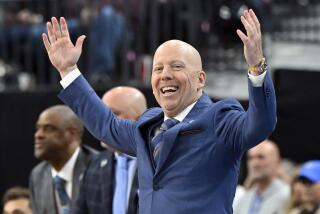Doug Erickson is the can-do UCLA basketball man dating back to last title
He is the last continuous link to UCLA basketball greatness, the last Bruin standing from the raising of a national championship banner.
He never won a game or ignited a roar from the Pauley Pavilion faithful, but for three decades he’s been the program’s quietly revving motor, fulfilling a variety of requests that typically start with the same two words:
Hey, Doug …
“Everybody knows Doug,” said former Bruins coach Jim Harrick, “and everybody calls Doug for everything they need at UCLA.”
Answering phones, booking flights and hotels, ordering meals, recording games, arranging practice times, distributing tickets — Doug Erickson does it all as UCLA’s director of basketball administration.
That made him a regular dinner companion for coach Mick Cronin after Cronin took the Bruins job last spring, eager to soak up as much information as possible from the guy he calls “an encyclopedia on UCLA basketball.”
In 28 years, Erickson has worked with five head coaches, two interim coaches, 24 assistants and 158 players, outlasting everyone besides mascot Joe Bruin.
“He was recommended to me,” former UCLA coach Ben Howland said, “by none other than John Wooden.”
Jorge Salcedo, an ex-UCLA soccer coach charged in the admission of two students for bribes, will plead guilty to conspiring to commit racketeering.
Like the legendary coach, Erickson, 54, operates as inconspicuously as possible, content to be a cherished resource almost no one outside the program ever hears about. When the novel coronavirus outbreak relegated a 25-year reunion of UCLA’s last national championship to a Zoom teleconference, Erickson modestly declined to participate.
“He got a ton of texts from people who said, ‘Doug, where are you? You should be on this thing,’ ” said Kenny Donaldson, a UCLA associate athletic director and close friend. “He was invited, and thought about it, but said, ‘Hey that should be for the players, for the coaches, it’s not really about me.’
“He never makes it about himself.”
::
The internet was just taking off, and Steve Lavin, then a rising assistant coach, thought he had happened upon a computer genius.
They met in 1992 through Erickson’s brother Al, Lavin’s teammate at Chapman College. The brothers were part of a basketball family in which all four siblings and both parents played the game at least through high school.
Doug Erickson had worked in revenue accounting for a Silicon Valley software and engineering services company, and that apparently was enough to convince Lavin that Erickson was a computer expert. After touting Erickson’s prowess to Harrick, Lavin overheard his boss parrot the information to Pete Dalis, then the Bruins’ athletic director.
“He’s a comp-uuuter geen-iuuus, Pete,” Harrick said in his West Virginia twang.
Unbeknown to anyone at UCLA, the description was entirely inaccurate.
“I didn’t know what a file was, a folder,” Erickson said.
After he was hired, Erickson persuaded a secretary to leave her computer on when she left the office so he could familiarize himself. The ruse didn’t last long.
“She eventually caught on and said, ‘You don’t really know much about the computer, do you?’ ” Erickson recalled. “And I said, ‘Well, I learned on a different system.’ Total BS.”
Erickson spent his first few years as Lavin’s roommate, taking a spot on the living room floor that he covered with bed sheets. Wooden dubbed Erickson “The Floor Sleeper,” the start of years of good-natured needling.
One of Erickson’s duties was to take the piles of letters, basketballs and other memorabilia addressed to Wooden via UCLA to the coach’s Encino condominium to have them signed. They invariably spent hours together, Erickson listening as Wooden told stories. It was a weekly ritual that Erickson treasured, except for the time he made the mistake of referring to Wooden by the one nickname the coach hated.
“We were watching a Monday Night Football game and he was predicting what was going to happen and I said, ‘Wow, you truly are the Wizard of Westwood,’ ” Erickson recalled. “He just turned to me and said, ‘Don’t ever call me that.’ ”
Erickson excused himself to use the bathroom and — best he can remember — started crying.
Those words were never uttered again, and quickly forgotten by the coach, who continued to invite Erickson back.
::
The turbulence started somewhere over the Grand Canyon and never abated, the plane buffeted by storms as it careened over the Midwest on a four-hour flight from Los Angeles to Memphis, Tenn., on Jan. 22, 1999.
“We thought the plane might be going down,” Erickson said.
Freshman JaRon Rush was so frightened he sought comfort by placing his head in the lap of teammate Earl Watson. After the plane landed, Erickson checked with the pilots of the connecting flight to Louisville, Ky., and was told that it would be a rough takeoff.
Rush had already made up his mind: No way was he going to take that flight.
Erickson drove Rush and three staffers 375 miles to Louisville while the rest of the team took an hourlong flight.
Paul Martinez loved his L.A. sports teams. His death due to complications related to coronavirus is a loss that extends beyond his family and friends.
“I was very relieved,” Rush said, remembering the white-knuckled ordeal.
He wasn’t the only one. Erickson, also a nervous flier, was thankful to be on terra firma — until, with about four hours of driving ahead, he called the team hotel to see how the flight had gone. Perfect, he was told. No turbulence.
The next day, UCLA beat Louisville. Rush had eight points and nine rebounds before taking a sedative to help him get through the uneventful flight home.
::
Most of the work is unremarkable. Running summer basketball camps. Making sure parents get the right seats at games. Giving a coveted high school prospect a campus tour because the new head coach doesn’t know the layout and none of his assistants have arrived.
“I always credit Arron Afflalo signing with UCLA to my campus tour,” Erickson cracked of the guard who played on two Final Four teams.
More consuming was the annual task of preparing for a potential NCAA tournament appearance. Erickson would tape every televised college basketball game to give UCLA coaches an early edge in scouting. In the years before DirecTV, this involved manually switching channels and changing VCR tapes at all hours, coming in at midnight just to make sure he got Colgate vs. Navy.
Even recording games digitally was a pain. He recorded about 2,500 games a year and organized them in a database for quick retrieval. (The process has since been eliminated by the advent of Synergy, a downloadable game-by-request system.)
The payoff came when NCAA tournament matchups were announced. Within minutes, UCLA coaches knew exactly how much footage they had of their first-round and potential second-round opponents.
“He would say, ‘I have 11 [tapes] of University of Richmond and I have 14 of Indiana,’” Howland said of Erickson, “so we weren’t waiting.”
The most iconic shot in UCLA history — by Tyus Edney with 4.8 seconds left in a 1995 March Madness game — originated on a makeshift driveway court.
One tape included amusing audio of the guy who made it. When UCLA played at California late in the Howland era, a Golden Bears football player seated in the student section saw Erickson milling about the edge of a huddle during a timeout.
Sizing up Erickson’s bald head and gray Mandarin suit — its high collar reminiscent of a character from Austin Powers movies — the player shouted, “Hey, look, it’s Dr. Evil,” leading fellow students to chant “Dr. Evil! Dr. Evil!”
As Howland remained locked on his adjustments, guard Kyle Anderson and forwards David and Travis Wear cracked smiles.
::
He did leave once, in April 2000. Erickson went to work for a ticket company, his office situated in a basement. He had no interaction with anyone and hated it.
UCLA had just thrown him a going-away party when he called Lavin, who had gone from being his roommate to being his boss, and asked for his job back. He had been gone only five months.
“Total U-turn club,” Erickson said. “But I was happy to be back.”
He had not missed a game, keeping his streak of continuity intact. He doesn’t intend to leave again before retirement, and he hopes at least one more banner is raised.
“I want to finish my career at UCLA, and I love what I do,” Erickson said. “Some days are bad but still great, and I love it.”
More to Read
Go beyond the scoreboard
Get the latest on L.A.'s teams in the daily Sports Report newsletter.
You may occasionally receive promotional content from the Los Angeles Times.

